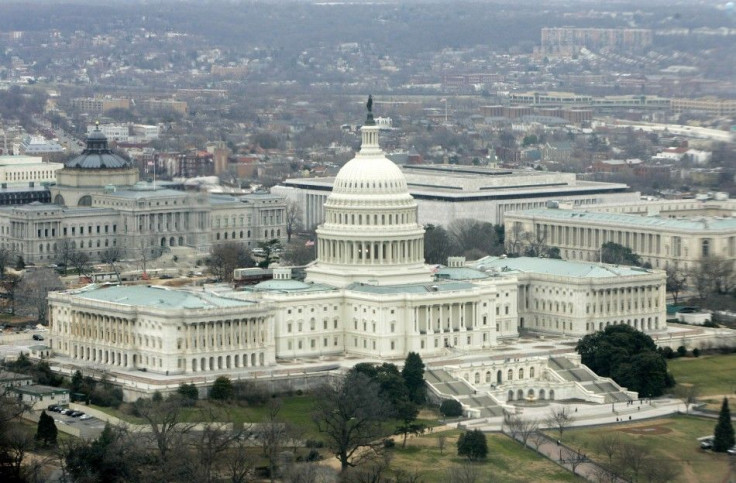Deficit Lobbying Gets Louder as Nov. 23 Deadline Looms

Richard Smith, a retired attorney and U.S Navy veteran, has a message for Sen. Jon Kyl, R-Ariz., and the rest of the special bipartisan committee in Congress that is trying to reach a deal to cut the deficit.
For me, a society is only as good as it treats people that are less able to take care of themselves, Smith said at a small rally against potential cuts in education and programs for the poor, held outside Kyl's office in Phoenix.
Smith and a dozen fellow demonstrators standing with signs that read Cuts Kill Jobs and Honk for Jobs may not have seemed like much of a force in the tumultuous political debate over how to close Washington's annual deficit, which has been topping $1 trillion a year.
But they are part of a large and increasingly personal lobbying campaign to sway the six Republicans and six Democrats on the so-called super committee as they approach a Nov. 23 deadline for striking a deal to trim the fiscal shortfall by at least $1.2 trillion over 10 years.
Much in doubt is whether Kyl and his fellow panelists have time to listen, as the committee struggles to avoid a deadlock that would usher in automatic spending cuts in defense, the Medicare health insurance program for the elderly, and discretionary domestic spending.
Every day now, the influence of lobbying diminishes where the super committee is concerned, said a Republican lobbyist, speaking on condition of anonymity.
Aides to individual lawmakers say their respective bosses on the super committee are too busy trying to cut a deal to pay much, if any, attention to the newspaper and television advertisements by special-interest groups that seek to sway their thinking.
But Craig Holman of Congress Watch, a public-advocacy group, disagreed, saying: Members of the super committee are intensely paying attention. They are under one of the most extreme lobbying campaigns that we have seen in quite a while -- largely because so many interests are being impacted here.
Scores of lobbyists and groups -- representing everyone from airlines and doctors to defense contractors, oil companies and food stamp recipients -- have spent millions of dollars since Sept. 5 and mobilized thousands of people in hopes of deflecting the budget ax from their share of federal spending.
The group AARP, for example, opposes possible cuts to Medicare and the Social Security federal retirement program on behalf of older Americans. It alone has sent 7.3 million emails, letters, and messages to lawmakers from members since the summer, while spending millions of dollars on television commercials nationwide.
'Cut a Deal'
But less than two weeks before the committee's deadline, lobbying tactics that once aimed to influence not only the super committee members but also their colleagues in Congress have been tightened.
At this point, the lobbyists are very focused on the 12 members of the super committee, because it's clear that the [congressional] leadership is telling them to cut a deal, said Ethan Siegal of the Bethesda, Md.-based Washington Exchange, which analyzes policy issues for institutional investors.
Interest groups representing doctors, nurses, and hospitals have largely stopped running TV ads across the country and shifted focus to phone banks, letters, and emails aimed at super committee members and their staffs.
This week, after some groups pulled their national TV ads, the American Petroleum Institute took to the air waves in Pennsylvania, Ohio, and Michigan, the home states of four of the super committee's six Republicans -- Reps. Fred Upton and Dave Camp and Sens. Pat Toomey and Rob Portman.
The radio ads oppose possible changes in corporate tax deductions that API says would hurt the oil industry, eliminate jobs, and raise the cost of energy.
Camp and Upton are committee chairmen in the House of Representatives with jurisdiction over issues involving taxes and energy. Toomey and Portman sit on the Senate Budget Committee. Portman is influential in tax circles as a former White House budget director and member of the House Ways and Means Committee.
Other interest groups have taken out full-page print ads opposing cuts to Medicare, diabetes research, and military benefits in Washington political journals likely to be read by super committee members and their staffs.
Some lobby efforts are focusing on nonsuper committee members to position themselves for the congressional debate that would follow any deficit-cutting recommendation. Congress is required to vote on any super committee package by Dec. 23.
I get a hundred calls a day to my office, don't cut Medicare. Nobody's talking about cutting Medicare, what they're talking about is making it more efficient, Republican Sen. Tom Coburn, an influential lawmaker who does not sit on the super committee, told the Reuters Washington Summit.
Smith and his fellow activists in Phoenix, who included veterans, students, and unemployed people, were part of a multistate strategy that also had demonstrators outside the offices of Camp, Upton, Toomey, and super committee co-chair Jeb Hensarling, a Texas congressman.
A day earlier, thousands of elderly people and union members rallied against possible cuts to Social Security and Medicare outside the Boston offices of Democratic Sen. and super panelist John Kerry and Republican Sen. Scott Brown, whose vote could be crucial in the closely divided Senate.
We need Senator Kyl to hear the voice of the people, said 19-year-old Isaac Aranda back in Phoenix. I have no job ... there's not going to be enough money for retirement ... they are cutting opportunities for everybody.
(Reporting by Tim Gaynor in Phoenix, and by David Morgan, Thomas Ferraro, David Ingram, Andy Sullivan, and Emily Stephenson in Washington; Editing by Will Dunham)
© Copyright Thomson Reuters 2024. All rights reserved.






















